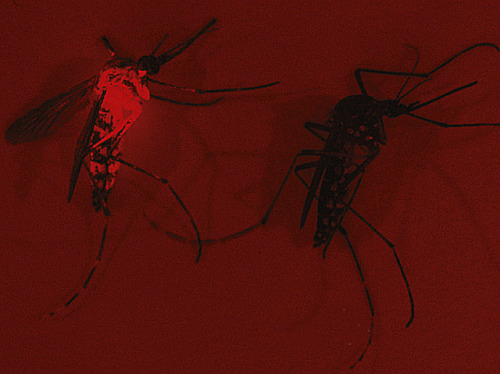
Sweat Sensors
Aedes aegypti mosquitoes, which can transmit diseases such as Zika, are especially attracted to humans, and this could be because of the unique smell of our sweat. Compared to other vertebrates, human sweat contains more lactic acid, potentially a useful clue for mosquitoes seeking a good meal. Based on previous work in flies, researchers hypothesised that mosquitoes would detect lactic acid using a specific type of olfactory [smell] receptor in their antennae. To test this, they disrupted the gene encoding one of these receptors, Ir8a, adding a fluorescent gene so that transformed mosquitoes could be identified by a red glow (pictured, left). Those mosquitoes couldn’t detect lactic acid and were less keen to land on human skin than untreated mosquitoes (right), suggesting both that Ir8a is indeed required for them to sense lactic acid, and that this is a key component of their attraction to us.
Written by Emmanuelle Briolat
- Image from work by Joshua I. Raji and colleagues
- Department of Biological Sciences & Biomolecular Sciences Institute, Florida International University, Miami, FL, USA
- Image originally published under a Creative Commons Licence (BY-NC-ND 4.0)
- Published in Current Biology, March 2019
You can also follow BPoD on Instagram, Twitter and Facebook
Archive link





Комментариев нет:
Отправить комментарий